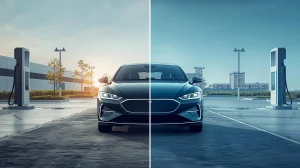Environmentally Friendly Vehicles: Driving Towards a Sustainable Future

In recent years, there has been a significant shift in the automotive industry towards environmentally friendly vehicles. With growing concerns about climate change and air pollution, manufacturers and consumers alike are embracing technologies that reduce the environmental impact of transportation. Let’s explore the various aspects of these eco-friendly vehicles and their role in shaping a sustainable future.
Types of Environmentally Friendly Vehicles
- Electric Vehicles (EVs):
Electric vehicles have gained immense popularity due to their zero tailpipe emissions and reduced reliance on fossil fuels. They are powered by electricity stored in batteries, which can be charged at home or through public charging stations. EVs come in various forms, including fully electric cars like Tesla Model S, Nissan Leaf, and hybrid electric vehicles (HEVs) like Toyota Prius. - Hybrid Vehicles:
Hybrid vehicles combine an internal combustion engine with an electric motor and battery. They can operate using either the gasoline engine, the electric motor, or a combination of both. This technology significantly improves fuel efficiency and reduces emissions compared to conventional gasoline-powered cars. - Plug-in Hybrid Vehicles (PHEVs):
Plug-in hybrid vehicles are similar to traditional hybrids but with a larger battery that can be charged by plugging into an external power source. PHEVs offer extended electric-only range, making them suitable for short commutes without using gasoline. - Hydrogen Fuel Cell Vehicles:
Hydrogen fuel cell vehicles use hydrogen gas to generate electricity through a chemical reaction with oxygen, producing water vapor as the only emission. These vehicles offer zero emissions and can be refueled quickly, making them a promising alternative to conventional gasoline-powered cars.
Environmental Benefits
- Reduced Greenhouse Gas Emissions:
By transitioning from internal combustion engines to electric motors or fuel cells, environmentally friendly vehicles significantly reduce greenhouse gas emissions. This helps mitigate climate change and improve air quality, especially in urban areas. - Decreased Air Pollution:
Unlike traditional gasoline-powered cars, electric and hybrid vehicles produce no tailpipe emissions. This reduces air pollution and the health risks associated with harmful pollutants like nitrogen oxides and particulate matter. - Resource Conservation:
Environmentally friendly vehicles promote resource conservation by reducing dependence on finite fossil fuels. Electric vehicles utilize renewable energy sources like solar or wind power, further minimizing environmental impact.
Technological Advancements
Advancements in technology have accelerated the development and adoption of environmentally friendly vehicles:
- Battery Technology:
Improved battery technologies have enhanced the range, performance, and lifespan of electric vehicles. Lithium-ion batteries, in particular, have become more efficient and affordable. - Charging Infrastructure:
Governments and private entities are investing in charging infrastructure to support the growing adoption of electric vehicles. Fast-charging stations are becoming more widespread, enabling quicker and convenient refueling. - Vehicle Efficiency:
Automotive manufacturers are continuously improving the efficiency of electric motors and powertrains. This includes optimizing aerodynamics, reducing weight, and implementing regenerative braking systems to maximize energy recovery.
Consumer Adoption and Government Initiatives
Consumer interest in environmentally friendly vehicles is on the rise, driven by lower operating costs, government incentives, and increased environmental awareness. Many countries offer subsidies, tax credits, and other incentives to promote the adoption of electric and hybrid vehicles. Additionally, stricter emissions regulations are encouraging automakers to invest in cleaner technologies.
Challenges and Future Outlook
Despite the promising advancements, challenges remain in the widespread adoption of environmentally friendly vehicles:
- Infrastructure Limitations:
The availability of charging stations and hydrogen refueling stations needs to be expanded to alleviate range anxiety and facilitate long-distance travel. - Cost Considerations:
The upfront cost of electric and hydrogen fuel cell vehicles remains higher than conventional cars, although this gap is narrowing as technology improves and economies of scale are achieved.
Looking ahead, continued innovation, supportive policies, and changing consumer preferences are expected to drive the transition towards a more sustainable transportation ecosystem. Environmentally friendly vehicles are not just a trend but a critical step towards reducing the environmental impact of personal and commercial transportation, paving the way for a cleaner and greener future.







